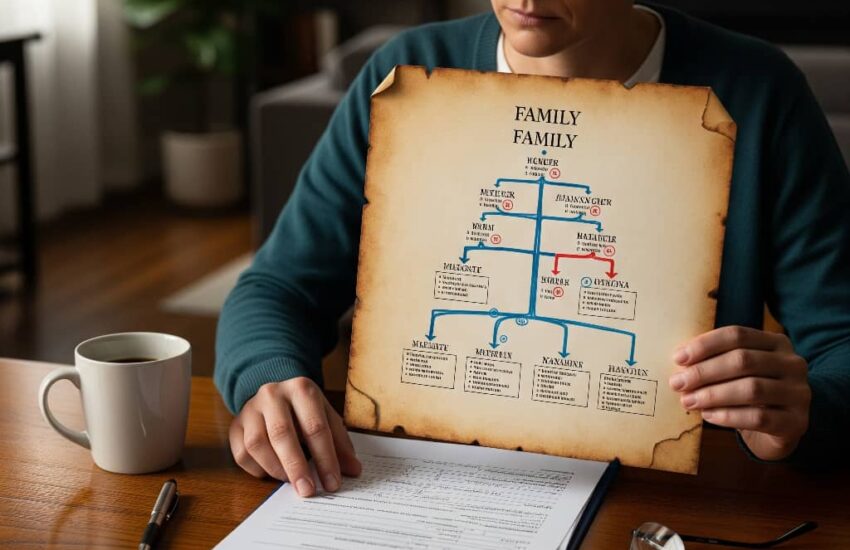Your family’s medical history can significantly influence your life insurance costs. Learn how insurers assess genetic risk and strategies to secure affordable coverage despite hereditary factors. When I applied for my first life insurance policy at age 32, I assumed my clean bill of health would guarantee the best rates. I ate well, exercised regularly, and had never smoked. But when the insurer’s application asked detailed questions about my parents’ and grandparents’ medical histories, I felt a familiar dread creep in. My father’s early heart attack. My grandmother’s battle with breast cancer. My grandfather’s diabetes. Suddenly, my healthy lifestyle seemed less relevant than the genetic blueprint I’d inherited. The resulting premium was nearly twenty-five percent higher than I’d anticipated not because of anything I’d done, but because of histories that weren’t mine to write.
Family medical history matters in life insurance underwriting because it provides statistical clues about your potential future health. Insurers aren’t just evaluating who you are today—they’re predicting who you might become decades from now. Actuarial data clearly shows that certain conditions tend to cluster in families, and while genetics aren’t destiny, they significantly influence risk assessment. My insurance broker explained it to me plainly: “They’re not saying you’ll develop your father’s heart condition. They’re saying the statistical probability is higher, and they price accordingly.”
The specific conditions insurers care about most include heart disease, cancer, diabetes, and neurological disorders like Alzheimer’s, particularly when they occur in first-degree relatives (parents or siblings) before certain ages. Early-onset conditions raise more red flags than those appearing later in life. My father’s heart attack at fifty-two weighed more heavily than my grandmother’s cancer diagnosis at seventy-eight. The insurer’s manual even had specific age cutoffs: heart disease before sixty, cancer before sixty-five, diabetes before fifty-five. Each condition occurring before these benchmarks could trigger premium ratings.
The manner of a relative’s death matters as much as the cause. My cousin learned this when her application was rated because her mother died in a car accident but the insurer discovered the accident was caused by a diabetic coma. Had the death certificate listed only “auto accident,” the rating might not have applied. This taught me that insurers don’t just take applicants’ word for family history; they often verify through medical information bureaus and sometimes even request medical records of deceased relatives.
Not all family history carries equal weight. My broker shared that insurers typically focus on patterns rather than isolated incidents. A single relative with cancer might not affect premiums significantly, but multiple affected relatives—especially across generations, likely would. Similarly, the type of cancer matters. A grandmother with skin cancer might be less concerning than a mother with ovarian cancer. The key is demonstrating that you’re proactively managing inherited risks through preventive care and lifestyle choices.
There are strategies to mitigate the impact of family history. I increased my life insurance coverage gradually through laddered policies rather than one large policy, which allowed me to secure some coverage at standard rates before my family history became more influential. I also invested in comprehensive medical exams before applying, generating evidence of my current health to counterbalance genetic probabilities. My cholesterol levels, blood pressure, and cardiac calcium scores all told a more positive story than my family tree alone suggested.
The timing of your application can make a dramatic difference. I watched a friend delay applying until after completing a preventive double mastectomy due to her BRCA gene mutation and strong family history of breast cancer. Though the surgery was medically proactive, the insurer viewed it as a pre-existing condition and rated her policy accordingly. Had she applied before the surgery, she might have received better rates. This counterintuitive reality underscores the importance of consulting an insurance professional before making major medical decisions.
Shopping among insurers is crucial because companies weight family history differently. Some carriers have more lenient underwriting guidelines for certain conditions. After my initial rejection for preferred rates, I worked with an independent broker who shopped my case with multiple insurers. The third company we approached placed less emphasis on paternal heart history and more on my personal health metrics, offering significantly better terms. This experience taught me that there’s no universal standard, each insurer interprets risk through their own lens.
The evolving science of genetics presents new complexities. With the rise of direct-to-consumer genetic testing, insurers increasingly ask whether applicants have undergone genetic testing. While the Genetic Information Nondiscrimination Act (GINA) prevents health insurers from using genetic information, life insurers aren’t bound by the same restrictions in most states. I chose not to pursue genetic testing specifically because I feared the results could further complicate my insurance prospects, a decision my broker supported as prudent.
Perhaps the most important lesson I learned is that family history isn’t necessarily a permanent barrier. Many insurers will reconsider ratings if you maintain excellent health for several years after policy issuance. My own policy was re-evaluated after five years of perfect cholesterol and blood pressure readings, resulting in a premium reduction. This taught me that while I can’t change my genetics, I can influence how they’re interpreted through consistent health management.
Family history in life insurance isn’t about fairness, it’s about statistics. But statistics aren’t destiny. By understanding how insurers view hereditary risks, taking proactive health measures, and working with knowledgeable professionals, it’s possible to secure affordable coverage that protects your family’s future without being penalized excessively for your past.
References
Cavendish Online. (2025). Does family medical history affect my life insurance? https://www.cavendishonline.co.uk/news/does-family-medical-history-affect-my-life-insurance
Probus Insurance. (2024, October 17). Family health history & life insurance costs: Key insights. https://www.probusinsurance.com/life-insurance/life-articles/understanding-the-link-between-family-health-history-and-life-insurance-costs/
Risk Quoter. (2025, April 30). Family history and life insurance: What you need to know. https://www.riskquoter.com/blog/family-history/
Legal & General. (2025, June 3). Family medical history and life insurance. https://www.legalandgeneral.com/insurance/life-insurance/health/medical-history-life-insurance/
Royal London. (2025, January 15). Will my family medical history affect my life insurance? https://www.royallondon.com/guides-tools/life-insurance-guides/will-my-family-medical-history-affect-my-life-insurance

